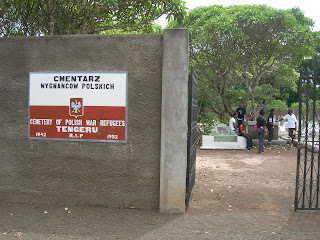Thursday, January 24, 2013
Bride price
Tuesday, January 15, 2013
Cześć
I am in Arusha for a few days and yesterday I followed up an extraordinary story that I stumbled on via a chance mention in an Ernest Hemingway novel. Did you know that 20,000 Polish people were relocated to various camps in East Africa in 1942? Their story is amazing, heroic and tragic. The Russians invaded Eastern Poland on September 17th 1939 and immediately began deporting undesirables and anti-Soviets. Over a million, including thousands of children, typical crime - being being a member of the Polish scouts, were transported to Siberia. In July 1941, after Hitler invaded Russia, they were "freed" and, emaciated and exhausted they made their way south via Central Asia to the Persian Gulf. Of those who made it, most of the men joined the British 8th Army later fighting at Monte Cassino. The British Government decided to send the rest, mostly women and children, many of whom were orphans, to East Africa. There were 22 camps, in Kenya, Tanganyika, Uganda, Rhodesia, and South Africa. One of them was in Marandellas where my sister and I went to school. The biggest, with 4000 inhabitants, was at Tengeru, about 10 miles East of Arusha.
Yesterday I got the dalla-dalla to Tengeru, then a boda-boda (motorbike taxi) to "Polish Cemetery". It was an exhilarating, not to say scary ride up and down some very bumpy and steep tracks, but very scenic, through an area of agricultural parkland. I was dropped at the cemetery gate.
The graves are mostly of a pattern and closely spaced, shaded by mature frangipani trees inside a high wall. The nice guardian told me that the cemetery is kept up by the Polish embassy in Nairobi. The camp closed in 1952 and, after a prolonged fight to avoid being sent back to communist Poland, the orphans eventually started new lives in Canada or Australia. The visitors' book showed quite a few Canadian and Australian Poles, some of them said "My grandmother is buried here", one said "I was born here". I walked back to the main road through what was the Polish farm and is now an Agricultural College and Research Station. I fancied that the farm buildings looked Polish, low and tiled with shutters at the windows.
The accommodation blocks also looked as if they were the original camp houses. I got most of my information from a book called Stolen Childhood, a first-hand account by Lucjan Krolikowski. There are photos of the children at various stages of their epic journey. It has also slotted a little piece into a jigsaw for me. A few years ago in a Tashkent museum I was puzzled by a school photo from the 1940's of a group of Polish children in national costume. Did they make it to East Africa I wonder? Five of the camps were in Tanzania. I might be able to track down the ones in Kondoa and Morogoro. If anyone out there has any more information I would love to hear it.
Subscribe to:
Posts (Atom)


